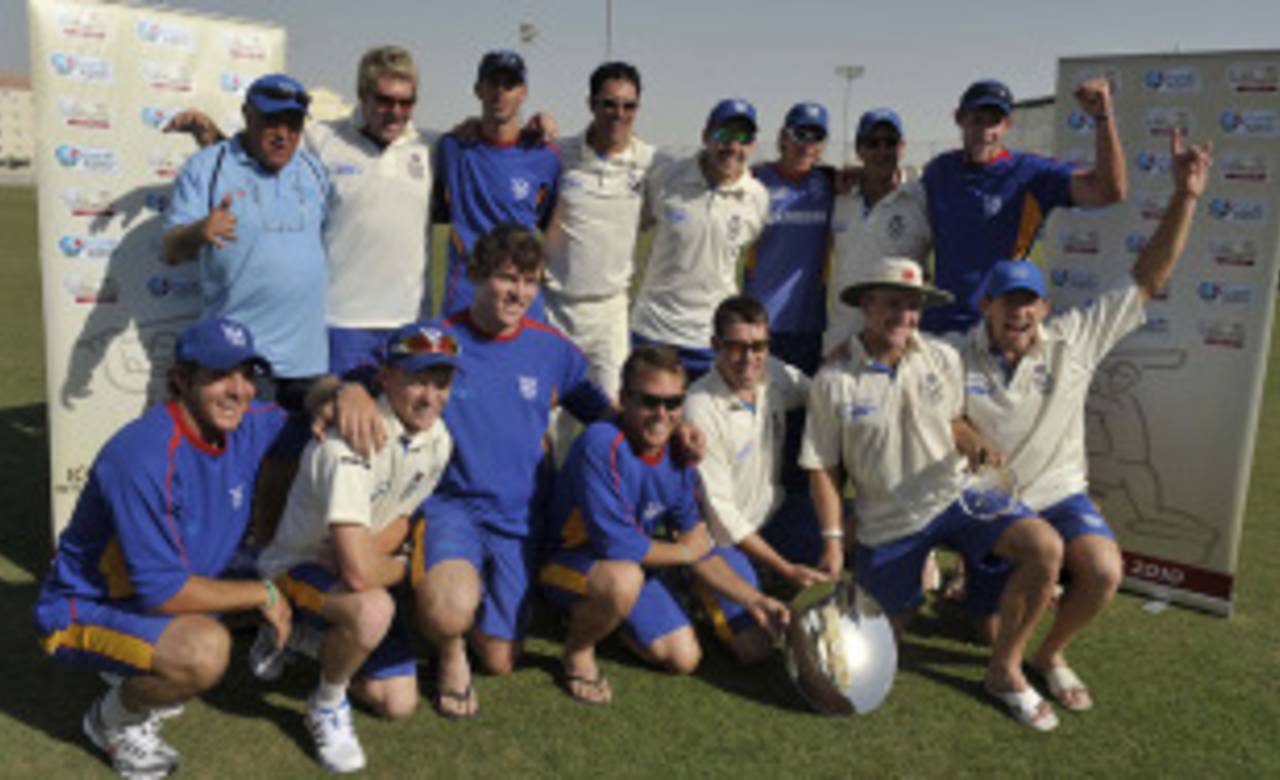Namibia more professional after rebuilding phase
A more established cricket structure has helped Namibia reach the World Twenty20 qualifiers after finishing in the top two of the Africa Division One Twenty20 tournament
Firdose Moonda
26-Jul-2011

Namibia won the Intercontinental Shield in 2010 • International Cricket Council
A more established cricket structure has helped Namibia reach the World Twenty20 qualifiers after finishing in the top two of the Africa Division One Twenty20 tournament. They last made international headlines when they qualified for the 2003 World Cup but are ready to get back on the biggest stage, with better organisation backing them this time.
"The national team have a more professional approach towards the game," Johan Rudolph, the Namibia coach, told ESPNcricinfo. "We have also been able to contract some players on a full-time basis."
Unlike many African Associates, Namibia have been able to invest money in the game. As part of the ICC's High Performance Programme (HPP), they receive funding from world cricket's governing body, but there is also a small contribution from the government, a larger sponsorship from cellular telephone company MTC and small donations from others.
"We started in a garage which we used as an office and put into place a development program, financial budgets and administrative policies and procedures," Laurie Pieters, chief executive of Cricket Namibia, said. "This has now grown so that we have a dedicated office with a chief executive, development manager, national cricket coach and 12 staff, including development co-ordinators and officers as well as a full-time ground curator with ground staff."
While the infrastructure has steadily got better, the cricket has yo-yoed between successful and disappointing. Namibia all but disappeared off the scene after the 2003 World Cup, where they failed to win a single match. Since then, they've taken small steps, first by qualifying for the Intercontinental Cup at the end of 2006, the HPP in 2007 and eventually playing in the final of the Intercontinental Cup against Ireland in the 2007-08 season.
However, they have since dropped down to the World Cricket League Division Two and suffered a disappointing 2009 World Cup qualifier campaign, where they scraped through to the Super Eights and then finished last. Now, having been selected to play in the Intercontinental Cup again this year and with their success in the twenty-over version of the game, Namibia are aiming for a more steady progression, especially since their rebuilding phase is just about complete.
"After the 2003 World Cup many of our players retired," Pieters said. "However, we had a core group from which we could build another squad. Further to that there were promising Under-17 and Under-19 players who have graduated. We now have a settled squad, eight of whom have full-time contracts." The likes of batsman Jan Berrie-Burger and allrounders Bjorn Kotze and Gerrie Snyman, who were in their early 20s during the 2003 World Cup, are now the senior players of the side. Youngsters such as Louis van der Westhuizen have come up the ranks from the Under-19s and are establishing themselves in the side.
Together, that youth and experience combined almost flawlessly in the Twenty20 tournament in Kampala, where Namibia won eight matches before losing to Uganda in the final. Twenty-over cricket has been earmarked as the format in which smaller nations will be blooded in cricket. Despite that, only two slots have been made available for next year's World Twent20 in Sri Lanka, and Rudolph thinks that all teams will "need to be on top of their game and be very lucky to qualify for this one."
He also does not want the country to focus on the shortest format only. "I don't believe this is the only format for the Associates to be involved in. The longer version is where you learn the game and playing only T20 cricket can send the wrong message to the Associates," Rudolph said.
While matters off the field have improved, on the park Namibia still have a battle to fight when it comes to playing enough four-day cricket against quality opposition. "You can only practise so much and only play so much club cricket," Rudolph said. "You need to create opportunities for teams to play against stronger opposition." Namibia compete in South Africa's amateur competition, which will become a semi-professional league from this season, exposing them to first-class cricket. They finished in last place in the competition in the 2010-11 season.
Firdose Moonda is ESPNcricinfo's South Africa correspondent